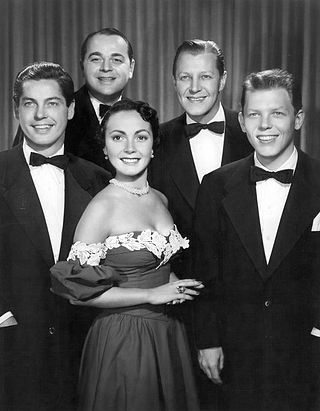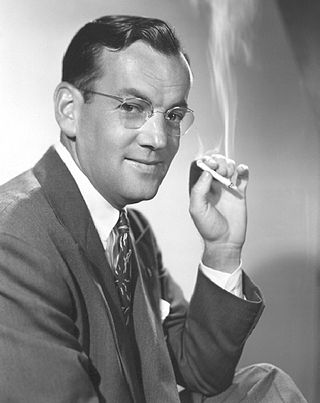
Charles Luckyth Roberts, better known as Luckey Roberts, was an American composer and stride pianist who worked in the jazz, ragtime, and blues styles. Roberts performed as musician, band/orchestra conductor, and dancer. He taught music and dance. He also owned a restaurant and bar in New York City and in Washington, D.C. Luckey Roberts noted compositions include "Junk Man Rag", "Moonlight Cocktail", "Pork and Beans" (1913), and "Railroad Blues".

Glenn Miller and His Orchestra was an American swing dance band that was formed by Glenn Miller in 1938. Arranged around a clarinet and tenor saxophone playing melody, and three other saxophones playing harmony, the band became the most popular and commercially successful dance orchestra of the swing era and one of the greatest singles charting acts of the 20th century. As of 2024, Ray Anthony is the last surviving member of the orchestra.

Marion Hutton was an American singer and actress. She is best remembered for her singing with the Glenn Miller Orchestra from 1938 to 1942. She was the sister of actress and singer Betty Hutton.

The Glenn Miller Story is a 1954 American biographical film about the eponymous American band-leader, directed by Anthony Mann and starring James Stewart in their second non-western collaboration.

Gordon Lee "Tex" Beneke was an American saxophonist, singer, and bandleader. His career is a history of associations with bandleader Glenn Miller and former musicians and singers who worked with Miller. His band is also associated with the careers of Eydie Gormé, Henry Mancini and Ronnie Deauville. Beneke also solos on the recording the Glenn Miller Orchestra made of their popular song "In The Mood" and sings on another popular Glenn Miller recording, "Chattanooga Choo Choo". Jazz critic Will Friedwald considers Beneke to be one of the major blues singers who sang with the big bands of the early 1940s.

"It Happened in Sun Valley" is a 1941 song composed by Harry Warren, with lyrics by Mack Gordon. It was recorded and featured by Glenn Miller and his orchestra in the movie Sun Valley Serenade.

The Modernaires were an American vocal group, best known for performing in the 1940s with the Glenn Miller Orchestra.

Orchestra Wives is a 1942 American musical film by 20th Century Fox starring Ann Rutherford, George Montgomery, and Glenn Miller. Lynn Bari, Carole Landis, and Cesar Romero appear in support.
"Skylark" is an American popular song with lyrics by Johnny Mercer and music by Hoagy Carmichael, published in 1941.

"Moonlight Bay" is a popular song. It is commonly referred to as "On Moonlight Bay". The lyrics were written by Edward Madden, the music by Percy Wenrich, and was published in 1912. It is often sung in a barbershop quartet style. Early successful recordings in 1912 were by the American Quartet and by Dolly Connolly.
"Moonlight Becomes You" is a popular song composed by Jimmy Van Heusen with lyrics by Johnny Burke. The song was written for the Paramount Pictures release Road to Morocco (1942) and published in 1942 in connection with the film. Vic Schoen wrote the arrangement.
"Let's Have Another Cup of Coffee" is a song by Irving Berlin appearing in the musical comedy Face the Music, which opened in 1932. On opening night it was sung by J. Harold Murray and Katherine Carrington. The song, set in a self-service restaurant modeled on the Horn & Hardart Automat, is sung in the play by a group of once-wealthy citizens who were awaiting better times, as mirrored in the song's opening lyrics:

"Serenade in Blue" is a 1942 big band song composed by Harry Warren, with lyrics written by Mack Gordon. It was introduced in the 1942 film Orchestra Wives by Glenn Miller and His Orchestra, sung by Lynn Bari in the film but dubbed by Pat Friday.

Between 1938 and 1944, Glenn Miller and His Orchestra released 266 singles on the monaural ten-inch shellac 78 rpm format. Their studio output comprised a variety of musical styles inside of the Swing genre, including ballads, band chants, dance instrumentals, novelty tracks, songs adapted from motion pictures, and, as the Second World War approached, patriotic music.
James Kimball "Kim" Gannon was an American songwriter, more commonly a lyricist than a composer.
"Conchita Marquita Lolita Pepita Rosita Juanita Lopez" is a 1942 novelty song recorded by the Glenn Miller Orchestra; Bing Crosby with the Vic Schoen Orchestra; Dinah Shore; The Four King Sisters; Tommy Tucker and his Orchestra; and the Royal Air Force Dance Orchestra.
For music from an individual year in the 1940s, go to 40 | 41 | 42 | 43 | 44 | 45 | 46 | 47 | 48 | 49

"I Know Why " is a 1941 song by Glenn Miller and His Orchestra. The song appeared in the 20th Century Fox movie Sun Valley Serenade. The song was also released as an RCA Bluebird 78 single.

"Elmer's Tune" is a 1941 big band and jazz standard written by Elmer Albrecht, Dick Jurgens and Sammy Gallop. Glenn Miller and his Orchestra and Dick Jurgens and his Orchestra both charted with recordings of the composition.
"The Lamplighter's Serenade" is a song written by Hoagy Carmichael (music) and Paul Francis Webster (lyrics). The construction of the song was unusual and did not conform to the normal AABA pattern. Instead, Carmichael used an ABA format that proved most effective.














